Research Reports
OSPE regularly prepares reports to provide government with insight on issues occurring in Ontario and how they impact or involve engineers. Please see OSPE’s most recent advocacy reports below.

Engineering Sustainability Policies within the Building Sector in Ontario as a Basis for Impact on Equity Seeking Groups
January 2024
With the rise of climate change, many Canadian provinces and territories are adopting sustainability plans and making commitments to reduce greenhouse gas (GHG) emissions. The building sector has been at the centre of several sustainability plans, as it has been identified as a high-energy consumer and GHG emitter. The general purpose of this research is to understand the potential impacts of sustainability policies from the perspectives of academic and industry experts.
The research aims to investigate the perceived impacts of Ontario’s sustainability building policies from expert’s views. To achieve this objective the research is completed in three phases: (1) literature review, (2) interviews with experts, (3) analysis of the literature review and interviews. Based on the literature review and interviews with experts, there is a clear need for sustainability policies to be focused on technical aspects such as reducing greenhouse gas emissions or energy consumption. Another conclusion was made on the opportunity of individuals to participate in the sustainability movement by finding work in this sector. There will be a rise in employment due to the green movement. The rise will be directly in construction through primary jobs related to skilled trades, design, and finance.

Accessibility for Train Infrastructure
December 2023
With the increase in rail transportation development and use, we will likely see fewer vehicles on the roads and more people making public transportation their first choice. However, rail infrastructure throughout Canada is not always accessible to all people. Even when the public can access the platform to board the train, they face another obstacle: a gap between the train platform and the train floor.
As Canada does not currently have accessibility standards for rail infrastructure, this document will include a comparative analysis of relevant existing codes, standards, guidelines, studies and wide-reaching peer-reviewed publications. This document will also provide a recommendation on an allowable horizontal and vertical gap at the train-platform interface to ensure accessibility.

Engineers for Canada’s Quantum Workforce
November 2023
Quantum technologies have become the next hyped technology, and the unique capabilities that quantum technologies bring are expected to disrupt many industries. In view of a rapidly evolving global quantum ecosystem, the Canadian federal government recently released Canada’s National Quantum Strategy, which is investing $360 million dollars into Canada’s quantum ecosystem to support the three pillars of Research, Talent, and Commercialization. Canada needs diverse talent to establish a robust quantum workforce that can support its growing quantum ecosystem. Much of this talent can be sourced from Canada’s existing professionals, but transitioning into the quantum field can be difficult due to the field’s unique concepts and jargon. This two-part paper series introduces core concepts of quantum technologies and provides an outlook of the role engineers will have in contributing to quantum technology development.
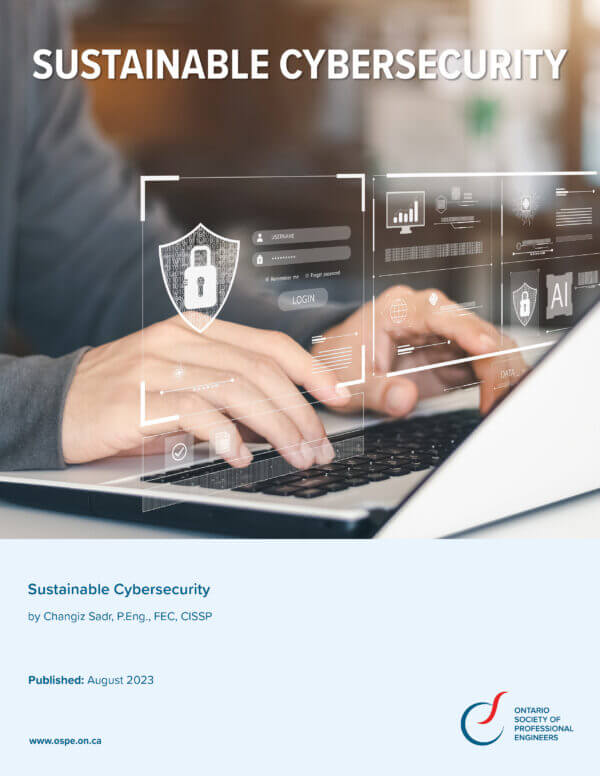
Sustainable Cybersecurity
August 2023
In our digital world, cybersecurity is critical to the safe function of nearly everything. While its execution may seem virtual in our minds, the reality is that it is a significant industry, demanding significant real-world assets. As such, there is an opportunity for providers to comply with sustainability standards set across many industries. For those who retain information security service providers, consider looking for those who not only provide robust cybersecurity services but also those who do so in an energy efficient and climate-conscious manner as advocated by this author below.
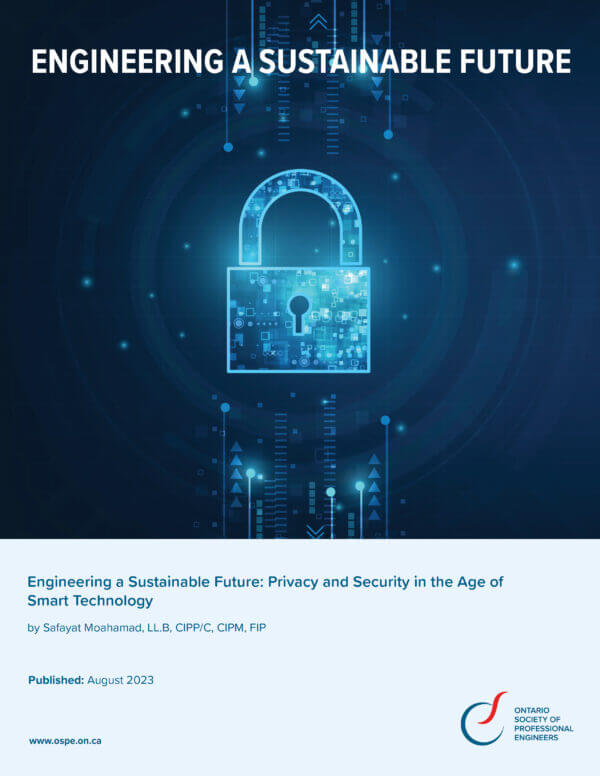
Engineering a Sustainable Future: Privacy and Security in the Age of Smart Technology
August 2023
While smart technologies have the potential to deliver sustainable economic growth and move society forward, they can also threaten to compromise personal autonomy, privacy, and security. This paper will outline the personal and societal risks posed by the rise of smart technologies, and identify how engineers can foster a culture of responsible innovation.
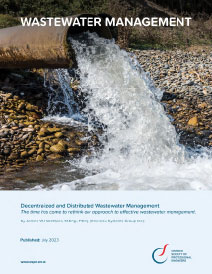
Decentralized and Distributed Wastewater Management
July 2023
For most of the past 100 years, the predominant model for wastewater management has been the centralized wastewater treatment (CWWT) facility. However, as our communities are embracing the need for greater sustainability, infrastructure security, and resilience, it may be time to evaluate and implement a more local alternative: a distributed network of decentralized wastewater treatment (DWWT) and resource recovery facilities. This paper outlines the benefits and potential applications of DWWT facilities, and identifies challenges and best practices for deploying a decentralized treatment model.

Quantum Technology: A Brief Introduction
July 2023
Quantum technologies have become the next hyped technology, and their unique capabilities are expected to disrupt many industries. This two-part paper series introduces the core concepts of quantum technologies and provides an outlook of the role engineers will play in contributing to quantum technology development.
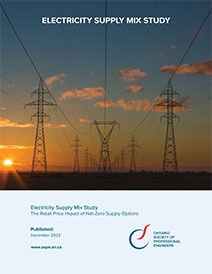
Electricity Supply Mix Study: The Retail Price Impact of Net-Zero Supply Options
December 2022
This report estimates the average retail electricity rate that Ontario consumers will pay using various generation supply technologies to achieve a net-zero emission goal by 2035. All the supply mixes that are presented are constrained by the need to meet the North American Electric Reliability Corporation (NERC) reliability criteria. The report examines various combinations of wind, solar, nuclear, pumped hydroelectric storage and battery energy storage systems. Estimates are also provided of the amounts of curtailed production, generation nameplate over-build and discarded thermal energy for each supply mix.
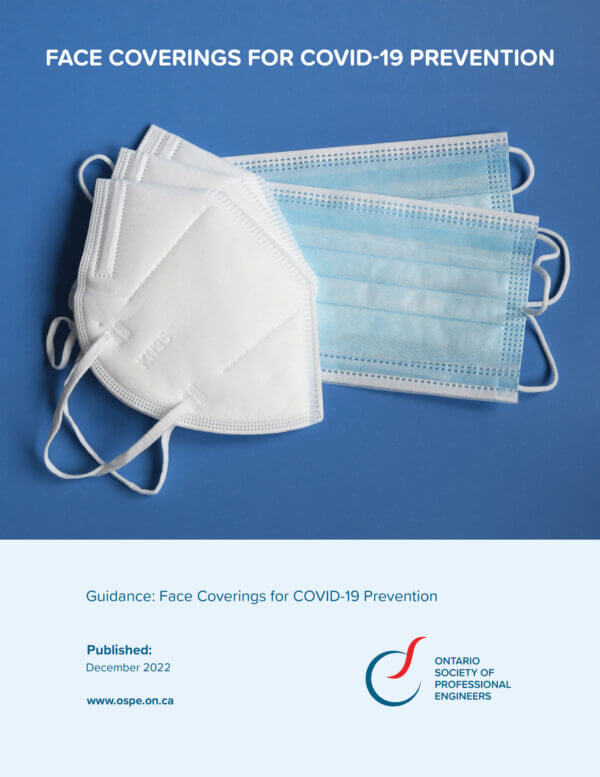
Indoor Air Quality Reports
December 2022
In 2022, OSPE formed the Indoor Air Quality (IAQ) Advisory Group, responding to the need for evidence-based guidance around indoor air quality and transmission of COVID-19. The Advisory Group produced the following reports, identifying how COVID spreads and how Ontarians can combat its spread.
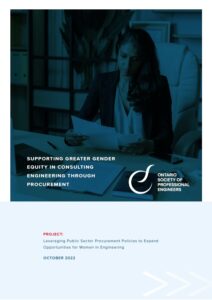
Leveraging Public Sector Procurement Policies to Expand Opportunities for Women in Engineering
June – October 2022
The purpose of this project, funded by Women and Gender Equality Canada (WAGE), is to explore the potential to use public procurement policy to advance diversity goals in the procurement of engineering services and to support increased career opportunities for women in consulting engineering and in the engineering profession.
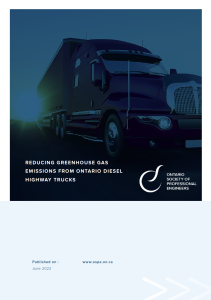
Reducing Greenhouse Gas Emissions From Ontario Diesel Highway Trucks
June 2022
Ontario’s fastest growing greenhouse emissions sector is diesel highway trucks. This Report explores how to reduce these emissions significantly, while maintaining a secure freight transportation system.
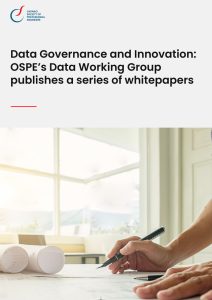
Data Governance and Innovation: OSPE’s Data Working Group publishes a series of whitepapers
May 2022
OSPE’s advocacy work is driven by our professional and experienced members. Over the past several months, members of our Data Working Group, a subgroup of our Research and Innovation Task Force, have used their expertise to write a series of white papers on Data Governance and Innovation.
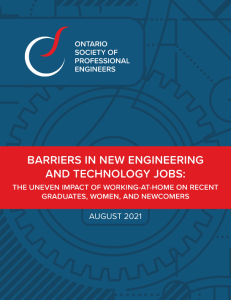
New Barriers In New Engineering and Technology Jobs: The Uneven Impact of Working-At-Home on Recent Graduates, Women and Newcomers
March 2022
This project investigated the impact of working-from-home on new graduates, women, and newcomers to Canada in engineering jobs. A significant increase in working remotely is one of the long-term effects of COVID-19. Without strategies to counter the negative effects of markedly reduced interaction with team leaders and other team members, firms will limit their hiring. These reports document the nature and extent of the new challenges and are based on a literature review, a survey of 1,243 engineering professionals, focus groups with engineers, and interviews with engineering employers.
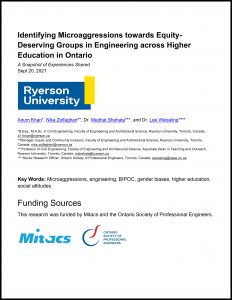
Identifying Microaggressions towards Equity-Deserving Groups in Engineering across Higher Education in Ontario
September 2021
Acknowledging that discrimination and prejudice of various sorts (e.g., verbal, behavioural, environmental) continue to exist in the education system, this research seeks to address how and why microaggressions against Black, Indigenous, and Persons of Colour (BIPOC), within engineering departments, show up across interactions between students and professors, among peers in classrooms, and across interactions in lab environments and other group activities or projects.
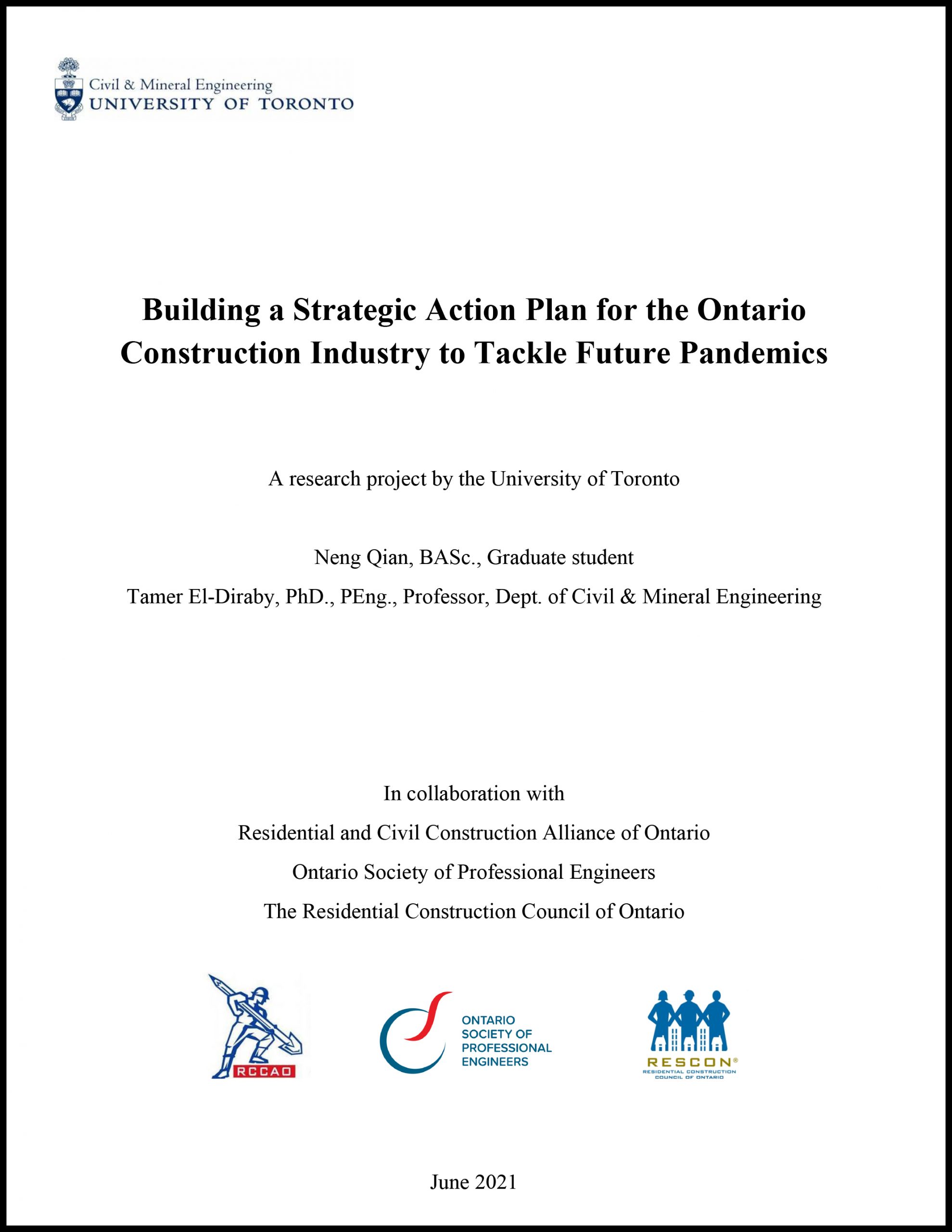
Construction in Pandemics Report
September 2021
This report summarizes the results of a research project conducted by a team from the University of Toronto on means to help the construction industry predict, plan and manage future pandemics. The project was conducted in collaboration with the Residential and Civil Construction Alliance of Ontario (RCCAO), the Ontario Society of Professional Engineers (OSPE), and the Residential Construction Council of Ontario (RESCON). This work is focused on the resilience of the overall industry against the challenges of future pandemics. How should we reformulate project design and construction methods to adapt to the disruptions of pandemics? How can industry organizations collaborate to tackle the pandemic collectively?
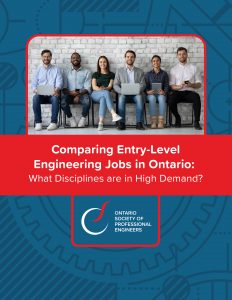
Entry Level Report
July 2021
This report demonstrates what type of engineering offers the best chance for a new graduate being hired in an entry level position and outlines career paths in different engineering disciplines. It is intended for engineering students, new graduates, and young people in high school (and their parents) considering pursing engineering in university and as a career. The report informs about what to expect when choosing a career and/or engineering discipline to pursue.
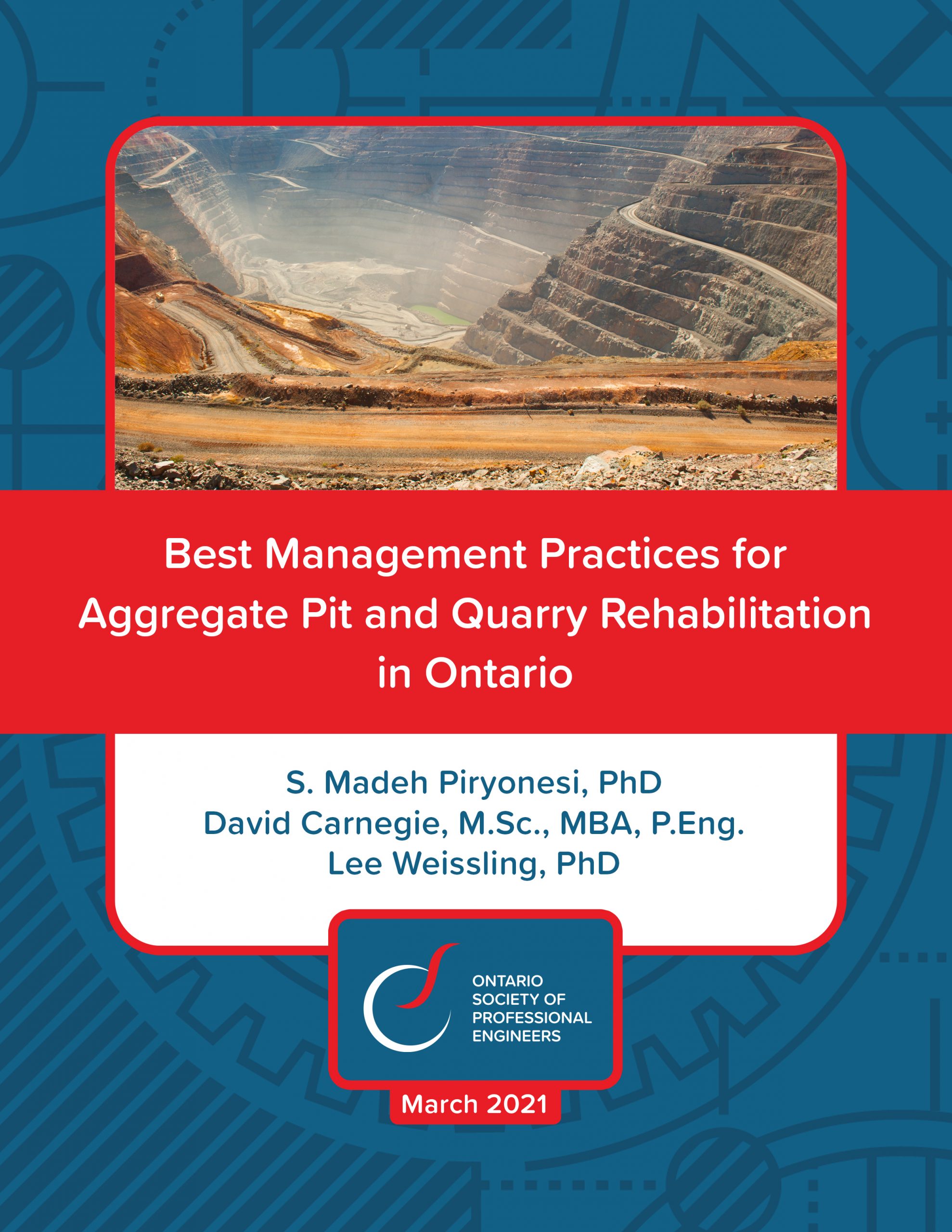
Excess Soil Reports
March 2021
In March 2021, OSPE, with support by an Excess Soil Project Steering Committee, completed a Scientific Report and Best Management Practices on the beneficial reuse of excess soil at aggregate pits and quarries. The reports are intended to assist Qualified Persons (QPs), municipalities, aggregate licensees, and operators in evaluating options for beneficially reusing excess soils to rehabilitate pits and quarries in a safe, economically viable, and climate positive manner.
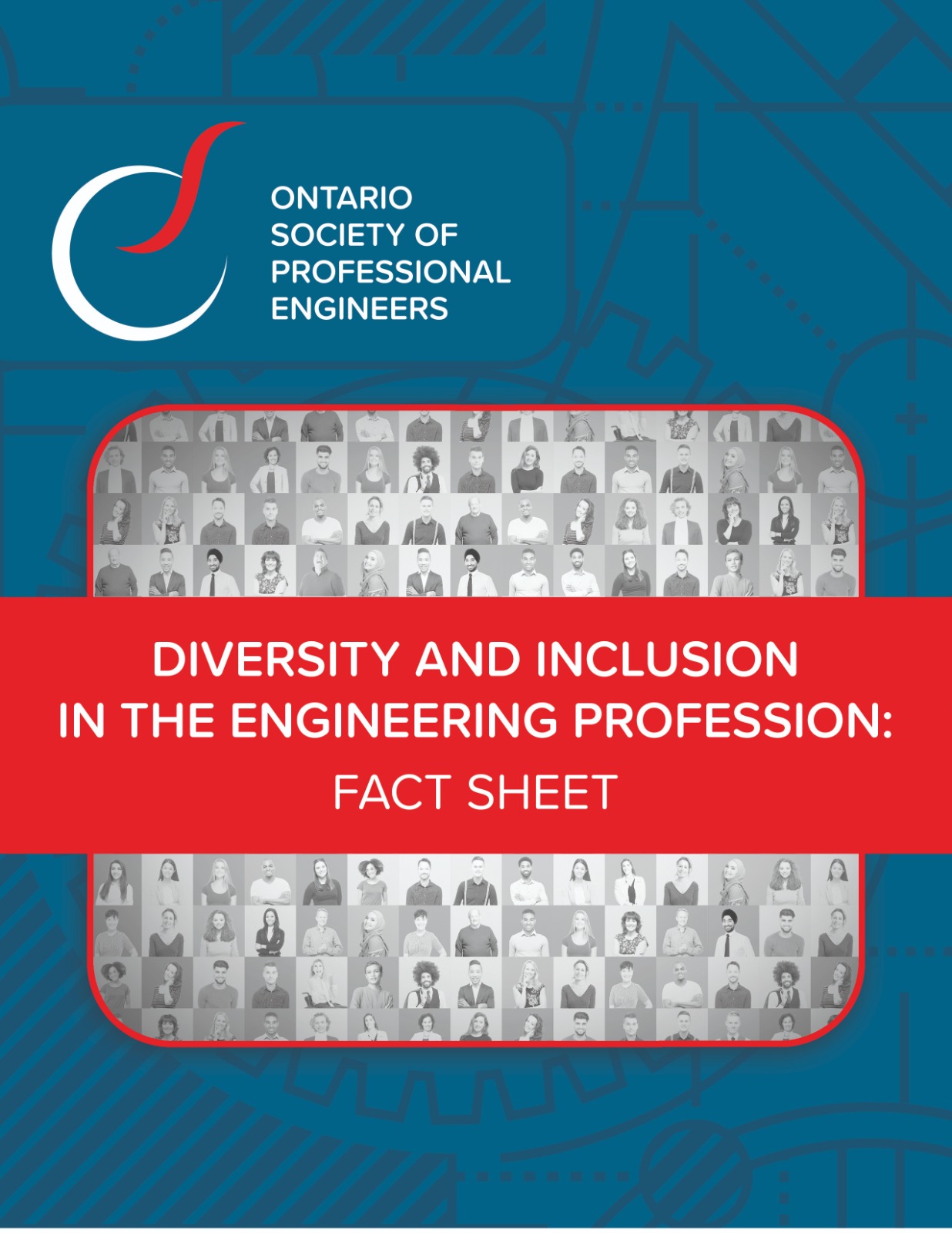
Diversity and Inclusion in the Engineering Profession: Fact Sheet
November 2020
This fact sheet presents data on the demographics of the engineering profession as of November 2020, which reflects the underrepresentation of numerous equity seeking groups, along with the bias and disparity in workplace experiences encountered by minority groups in the field.
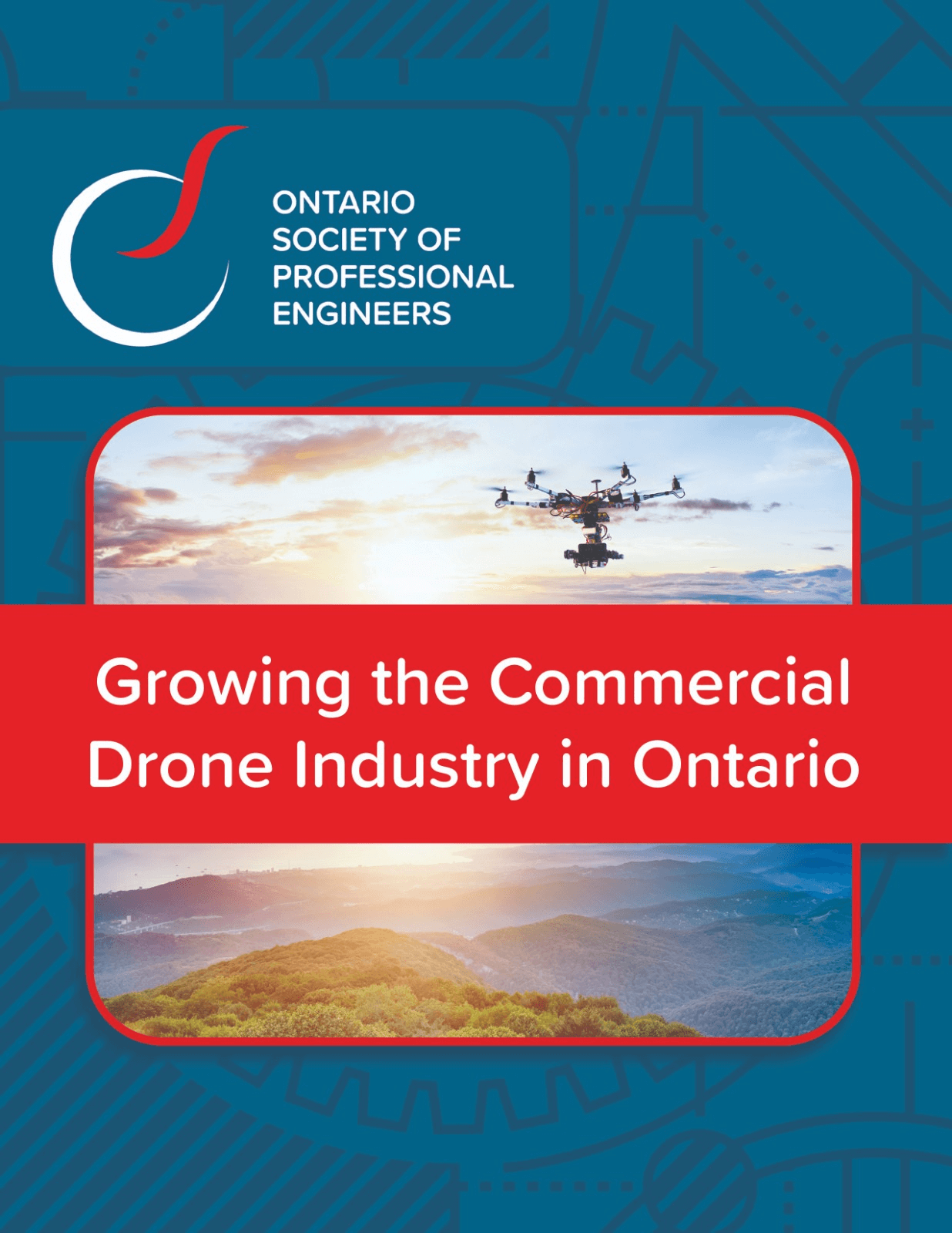
Growing the Commercial Drone Industry in Ontario
November 2020
This report presents an overview of the key issues regarding Remotely Piloted Aircraft Systems (RPAS), or drones, and proposes several recommendations for a provincial policy regarding these technologies. These recommendations focus on promoting the adoption of RPAS in commercial and civil sectors, funding the development of new business models using RPAS technology, and working with all levels of government to create a regulatory environment that promotes safety and innovation. With an effective policy response to this emerging technology, Ontario can create jobs, grow the economy, and adapt our industries to the 21st century.
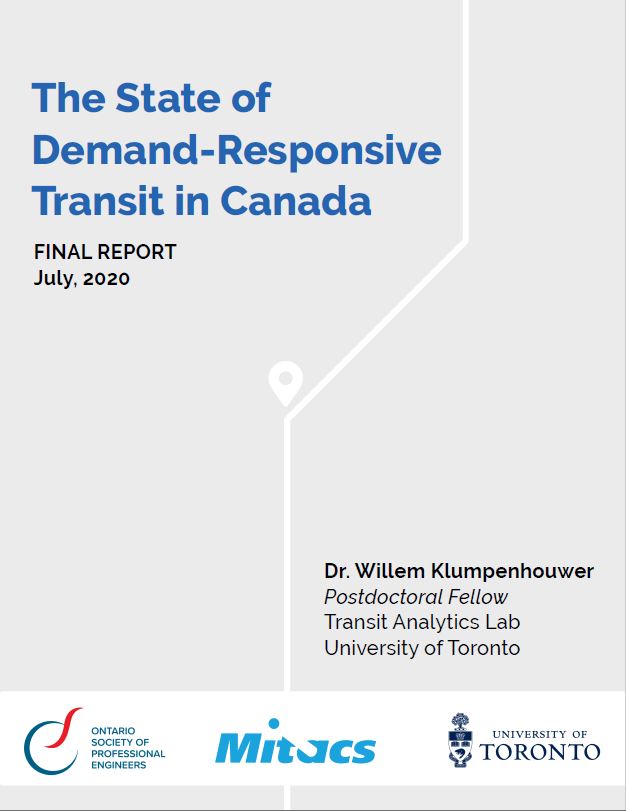
The State of Demand-Responsive Transit in Canada
July 2020
This study investigated the current state of practice of demand-responsive transit in Canada through a series of interviews with transit organizations and vendors. There is a growing number of communities that are being served by demand-responsive transit, including municipalities that had never had transit before. This report synthesizes and outlines some of the challenges, opportunities, and lessons learned from these transit projects.
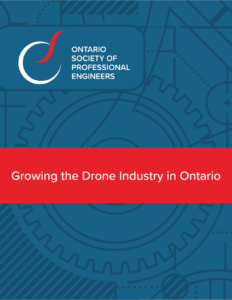
Growing the Drone Industry in Ontario
March 2020
Ontario is facing a critical juncture in the development of its drone industry. Drones, or Remotely Piloted Aircraft Systems (RPAS), can provide services to key industries in Ontario by capturing high quality data from the skies. With Canada’s largest economy, government funding programs, and a strong research ecosystem, Ontario is the ideal location to develop this emerging industry. First, obstacles such as international competition, scaling, and the problems arising from day to day adoption of drones must be solved.
Drone services could benefit industries that contribute over $600 billion to our national GDP. Ontario’s drone policy should focus on three key pillars to ensure we lead a future global industry set to be worth over $20 billion by 2020:
1. A roadmap for the integration of autonomous aircraft in our airspace
2. Bridging the gap in RPAS technology transfer from research to industry
3. Ontario taking a position of leadership in drone commercialization

Connected & Autonomous Vehicle Technologies
September 2019
OSPE strives to attract and deliver value to members at all stages of their careers, including students, through collaborative partnerships with other organizations, experts and stakeholders to strengthen our influence and ensure our data and messaging is sound.
With Mitacs[1] funding, OSPE recently partnered with Ryerson University’s Laboratory of Innovations in Transportation (LiTrans) to co-supervise a research project of a Masters student in Civil Engineering. Along with another partner, the Canadian Urban Transit Research and Innovation Consortium (CUTRIC), the project investigated technologies in which engineers play a significant role – Smart Mobility.

Retail Electricity Price Reform: Path to Lower Energy Bills and Economy-Wide CO2 Emission Reductions
April 2019
Ontario is wasting a significant amount of surplus emission-free electricity. The Government of Ontario can implement electricity price reform that will allow consumers to use that surplus to reduce their annual energy bill and greenhouse gas (GHG) emissions without imposing additional costs on the electricity system.
Briefing Note
Summary Report
Full Report

Propel Your Career in the Smart Mobility Industry: A Guide for Engineering Students and Recent Graduates
January 2019
This report was prepared for the Ontario Society of Professional Engineers (OSPE) and its partners – the Canadian Urban Transit Research and Innovation Consortium (CUTRIC), Ontario Chamber of Commerce (OCC) and Communitech. The purpose of the report was to provide content support for a digital resource that OSPE and its partners have developed a digital tool, propelusospe.ca. This digital resource provides engineering and technology students and recent graduates with up-to-date, industry-based information on Smart Mobility, skill needs and job search techniques in Canada’s auto and transit industries.

Calling all STEM Employers: Why Workplace Cultures Must Shift to Change the Gender Landscape
May 2018
This report summarizes findings based on interviews, focus groups and a survey of men and women in STEM professions. As well, university and college female students in STEM were consulted and surveyed to gather their perspectives about careers in STEM. Based on the feedback, we can confidently say that women in all STEM disciplines and roles face similar challenges in the workplace.

Opening Doors and Breaking Down Barriers: Highlights from Engineering Professional Success
July 2017
This report provides information about OSPE’s 18-month pilot mentorship program for women in engineering, which was launched thanks to funding from Status of Women Canada. The report identifies the experiences of mentors and protégées who participated, both international engineering graduates and Canadian engineering graduates, as well as the impact the program had on their engineering careers.

Weathering the Storms: Municipalities Plead for Stormwater Infrastructure Funding
July 2017
In order to assess Ontario’s ability to cope with the impending impacts of climate change and severe weather patterns, The Ontario Society of Professional Engineers (OSPE), Residential and Civil Construction Alliance of Ontario (RCCAO), and Ontario Sewer and Watermain Construction Association (OSWCA) have partnered to conduct a study of the condition of stormwater infrastructure and the type of asset management planning that is done in municipalities across Ontario.

Excess Soil Management: Ontario is Wasting a Precious Resource
November 2016
The Ontario Society of Professional Engineers (OSPE), the Greater Toronto Sewer and Watermain Construction Association (GTSWCA) and the Residential and Civil Construction Alliance of Ontario (RCCAO) have partnered to prepare a study on excess soil management to ensure sustainable practices are considered through the design and construction of Ontario’s infrastructure projects.

Ontario’s Energy Dilemma: Reducing Emissions at an Affordable Cost
March 2016
The world is facing serious decisions about how to address climate change. Choices have to be made about our energy future. Ontario has just transitioned out of coal generation and has reduced its electricity sector emissions by 80% below 1990 levels in a span of only 12 years. Ontario’s power system engineers want to share the experience they gained with other jurisdictions that are planning their own carbon reduction strategies. This report documents some of those experiences and offers insights on how to reduce GHG emissions.


